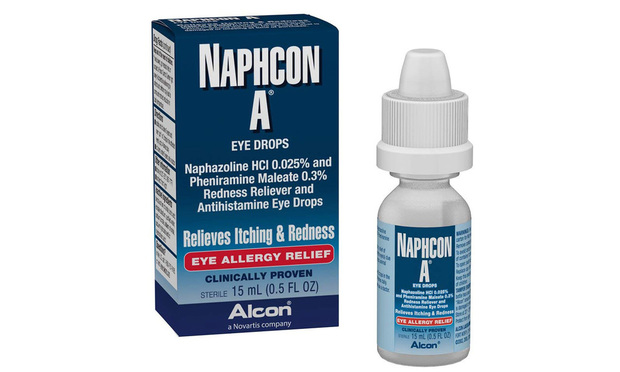Eye Drop Consumers Have Standing but No Case, First Circuit Rules
The case is one of at least six that Public Justice, a national nonprofit legal advocacy organization, has brought on behalf of consumers of eye drops.
August 28, 2018 at 06:13 PM
7 minute read
 Alcon Labratories, Naphcon A. Courtesy photo
Alcon Labratories, Naphcon A. Courtesy photo
A federal appeals court has tossed a class action brought over the size of eye drops even after finding that consumers had standing to sue.
The case is one of at least six that Public Justice, a national nonprofit legal advocacy organization, has brought on behalf of consumers of eye drops. They allege consumers paid too much for the medications, which they used to treat glaucoma and other illnesses, since the drops went to waste because they were too large for their eyes.
On Monday, the U.S. Court of Appeals for the First Circuit held that consumers alleged economic injuries sufficient to establish standing to sue—a ruling that aligned with the Third Circuit but split with the Seventh Circuit.
“There can be no real dispute that plaintiffs' claim of injury traces itself directly to the challenged conduct,” wrote Circuit Judge William Kayatta in a unanimous decision. “Nor can there be any doubt that plaintiffs' financial injury can be redressed by damages.”
The First Circuit sided with the Third Circuit's ruling but found the Seventh Circuit's “more appropriately aimed at the merits.”
However, the First Circuit tossed out the case after finding that the proposed changes that plaintiffs sought in the packaging required U.S. Food and Drug Administration approval—and that, he wrote, pre-empted their claims, which they brought under state laws. The ruling affirms U.S. District Judge Mark Wolf of the District of Massachusetts' decision on Sept. 29, 2017. Wolf dismissed the case after he concluded that federal pre-emption applied even though the plaintiffs had established standing.
Public Justice staff attorney Leah Nicholls said her group was evaluating whether to petition the First Circuit for a rehearing en banc. Seven plaintiffs from New York and Massachusetts brought the case on behalf of consumers in dozens of states.
“We are pleased that the First Circuit followed well-established law with regard to the plaintiffs' standing to bring their claims, but we obviously disagree with and are disappointed by the court's ruling on pre-emption,” she wrote in an email.
 Gregory Ostfeld. Courtesy photo
Gregory Ostfeld. Courtesy photoA lawyer who argued for the defendants, Gregory Ostfeld, a shareholder at Greenberg Traurig in Chicago, did not respond to a request for comment. Ostfeld represented Alcon Laboratories Inc., Falcon Pharmaceuticals Ltd. and Sandoz Inc., all owned by Novartis Pharmaceuticals Corp. Other defendants were Allergan Inc., Merck & Co. Inc., Pfizer Inc., Akorn Inc. and Bausch Health Companies Inc., formerly known as Valeant Pharmaceuticals International Inc., along with its subsidiaries, Bausch & Lomb and Aton Pharma Inc.
Merck attorney Stephen Strauss of Bryan Cave Leighton Paisner wrote in an email: “The 1st Circuit decision is an important ruling that recognizes pharmaceutical manufacturers cannot be forced to endure years of expensive litigation over an FDA-approved product design that cannot be changed without FDA's express approval. Determining whether eye drop dispenser designs are safe and effective is a task uniquely within the expertise of FDA that should not be second guessed in our courts.”
As to the standing issue, Strauss noted that the Seventh Circuit's decision came in a case that was much farther along than in the First Circuit, which, at a motion to dismiss, was “obligated to assume every well-pleaded allegation in favor of plaintiffs.”
Several organizations filed amicus briefs in the eye drop cases. In the First Circuit case, the U.S. Chamber of Commerce, the American Tort Reform Association, the National Association of Manufacturers and the Pharmaceutical Research and Manufacturers of America insisted that the plaintiffs had a “novel theory of standing” that, if approved, “would trigger a new wave of abusive, no-injury class-action litigation, with potentially devastating effects on businesses and consumers.”
“It would encourage plaintiffs' lawyers to bring large class actions challenging any business practice that could be portrayed as inefficient, based on conjecture that greater efficiency might have translated into savings for customers,” wrote Jeffrey Bucholtz of King & Spalding in Washington, D.C. “That would be disastrous for everyone but the lawyers.”
In a separate brief, the Product Liability Advisory Council cautioned that the plaintiffs were alleging a presumption against conflict pre-emption that contrasted with the supremacy clause.
Last year, in a similar case brought by Public Justice on behalf of eight classes of Illinois and Missouri consumers, Seventh Circuit Judge Richard Posner, who has since retired, reversed a class certification order after comparing eye drop consumers to the owners of pedigreed cats.
“The fact that a seller does not sell the product that you want, or at the price you'd like to pay, is not an actionable injury; it is just a regret or disappointment,” Posner wrote in a March 6, 2017, ruling in Eike v. Allergan. As a result, he wrote, the plaintiffs lacked standing to sue in federal courts under Article III of the U.S. Constitution. “One cannot bring a suit in federal court without pleading that one has been injured in some way (physically, financially—whatever) by the defendant.”
Then, on Oct. 18, the Third Circuit's Luis Felipe Restrepo authored an opinion in Cottrell v. Alcon Labs that reversed dismissal on standing grounds of another eye drops case. He wrote that the district judge inaccurately “cast the plaintiffs' allegations as mere grumblings that defendants' products were priced too high or packaged inefficiently, because the allegations lacked notes of fraud, deception, or misrepresentation.”
But in a dissent, Third Circuit Judge Jane Richards Roth said the majority permitted jurisdiction based on “nothing more than speculation about complex and industry-specific pricing models.”
The defendants, in the First Circuit case, relied on that dissent and a separate dissent by Third Circuit Chief Judge D. Brooks Smith in a Dec. 22 opinion denying a petition to rehear the case en banc. Smith said the majority's view created a “disparity with one of our sister circuits” that “could play mischief with our standing jurisprudence beyond the class action field.”
“What plaintiffs bargained for was medications that effectively treated their eye conditions, and they received exactly that,” wrote defense attorney Ostfeld in their First Circuit brief. “Plaintiffs' injury theory, if accepted, would turn almost every ordinary consumer purchase into an Article III case or controversy. Consumers would suffer an Article III injury whenever they are unable to squeeze the last of the toothpaste out of the tube or whenever some hairspray inevitably is dispersed into the air.”
They also insisted that federal pre-emption applied because changing the size of the droppers on their products would be a “major change” that requires approval from the U.S. Food and Drug Administration.
On appeal, the plaintiffs argued that Wolf got the federal pre-emption argument wrong. They said a change in the dropper would be a “moderate” change under FDA regulations that would not require approval.
As to the standing issue, plaintiffs sought to affirm Wolf's holding, insisting that consumers were paying as much as $1,000 a year extra for wasted drops.
“Plaintiffs' injury here is actual and imminent because, in fact, it has already occurred: Plaintiffs have already spent money on medication defendants' allegedly illegal conduct forced them to waste,” Nicholls wrote.
This content has been archived. It is available through our partners, LexisNexis® and Bloomberg Law.
To view this content, please continue to their sites.
Not a Lexis Subscriber?
Subscribe Now
Not a Bloomberg Law Subscriber?
Subscribe Now
NOT FOR REPRINT
© 2025 ALM Global, LLC, All Rights Reserved. Request academic re-use from www.copyright.com. All other uses, submit a request to [email protected]. For more information visit Asset & Logo Licensing.
You Might Like
View All
Trump Administration Faces Legal Challenge Over EO Impacting Federal Workers
3 minute read
US Judge Cannon Blocks DOJ From Releasing Final Report in Trump Documents Probe
3 minute read
Private Equity Giant KKR Refiles SDNY Countersuit in DOJ Premerger Filing Row
3 minute read
Skadden and Steptoe, Defending Amex GBT, Blasts Biden DOJ's Antitrust Lawsuit Over Merger Proposal
4 minute readTrending Stories
Who Got The Work
J. Brugh Lower of Gibbons has entered an appearance for industrial equipment supplier Devco Corporation in a pending trademark infringement lawsuit. The suit, accusing the defendant of selling knock-off Graco products, was filed Dec. 18 in New Jersey District Court by Rivkin Radler on behalf of Graco Inc. and Graco Minnesota. The case, assigned to U.S. District Judge Zahid N. Quraishi, is 3:24-cv-11294, Graco Inc. et al v. Devco Corporation.
Who Got The Work
Rebecca Maller-Stein and Kent A. Yalowitz of Arnold & Porter Kaye Scholer have entered their appearances for Hanaco Venture Capital and its executives, Lior Prosor and David Frankel, in a pending securities lawsuit. The action, filed on Dec. 24 in New York Southern District Court by Zell, Aron & Co. on behalf of Goldeneye Advisors, accuses the defendants of negligently and fraudulently managing the plaintiff's $1 million investment. The case, assigned to U.S. District Judge Vernon S. Broderick, is 1:24-cv-09918, Goldeneye Advisors, LLC v. Hanaco Venture Capital, Ltd. et al.
Who Got The Work
Attorneys from A&O Shearman has stepped in as defense counsel for Toronto-Dominion Bank and other defendants in a pending securities class action. The suit, filed Dec. 11 in New York Southern District Court by Bleichmar Fonti & Auld, accuses the defendants of concealing the bank's 'pervasive' deficiencies in regards to its compliance with the Bank Secrecy Act and the quality of its anti-money laundering controls. The case, assigned to U.S. District Judge Arun Subramanian, is 1:24-cv-09445, Gonzalez v. The Toronto-Dominion Bank et al.
Who Got The Work
Crown Castle International, a Pennsylvania company providing shared communications infrastructure, has turned to Luke D. Wolf of Gordon Rees Scully Mansukhani to fend off a pending breach-of-contract lawsuit. The court action, filed Nov. 25 in Michigan Eastern District Court by Hooper Hathaway PC on behalf of The Town Residences LLC, accuses Crown Castle of failing to transfer approximately $30,000 in utility payments from T-Mobile in breach of a roof-top lease and assignment agreement. The case, assigned to U.S. District Judge Susan K. Declercq, is 2:24-cv-13131, The Town Residences LLC v. T-Mobile US, Inc. et al.
Who Got The Work
Wilfred P. Coronato and Daniel M. Schwartz of McCarter & English have stepped in as defense counsel to Electrolux Home Products Inc. in a pending product liability lawsuit. The court action, filed Nov. 26 in New York Eastern District Court by Poulos Lopiccolo PC and Nagel Rice LLP on behalf of David Stern, alleges that the defendant's refrigerators’ drawers and shelving repeatedly break and fall apart within months after purchase. The case, assigned to U.S. District Judge Joan M. Azrack, is 2:24-cv-08204, Stern v. Electrolux Home Products, Inc.
Featured Firms
Law Offices of Gary Martin Hays & Associates, P.C.
(470) 294-1674
Law Offices of Mark E. Salomone
(857) 444-6468
Smith & Hassler
(713) 739-1250










